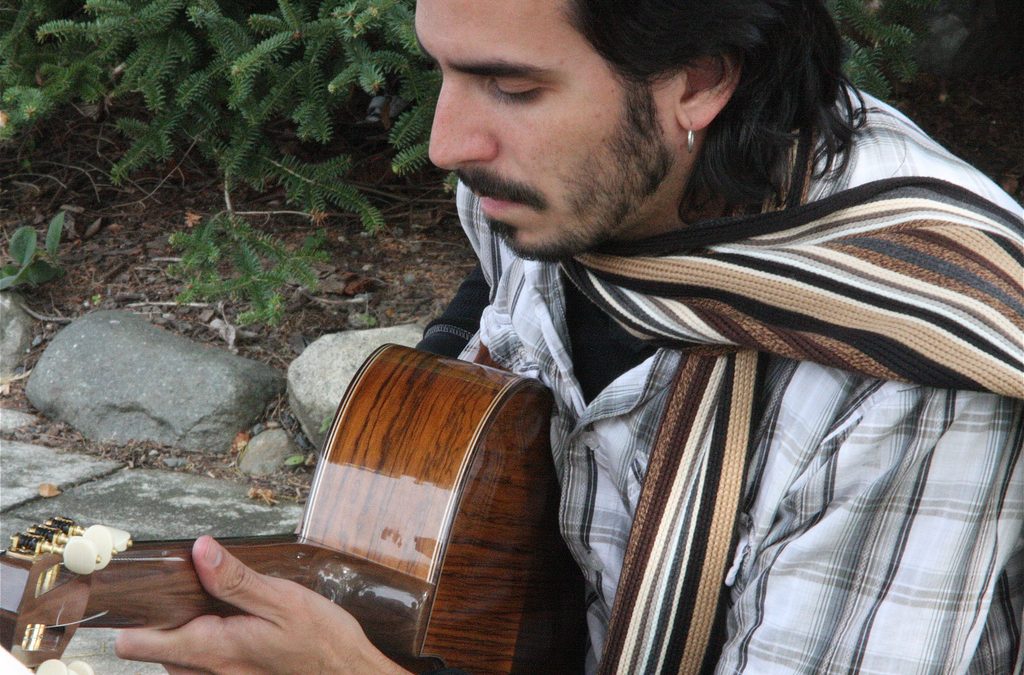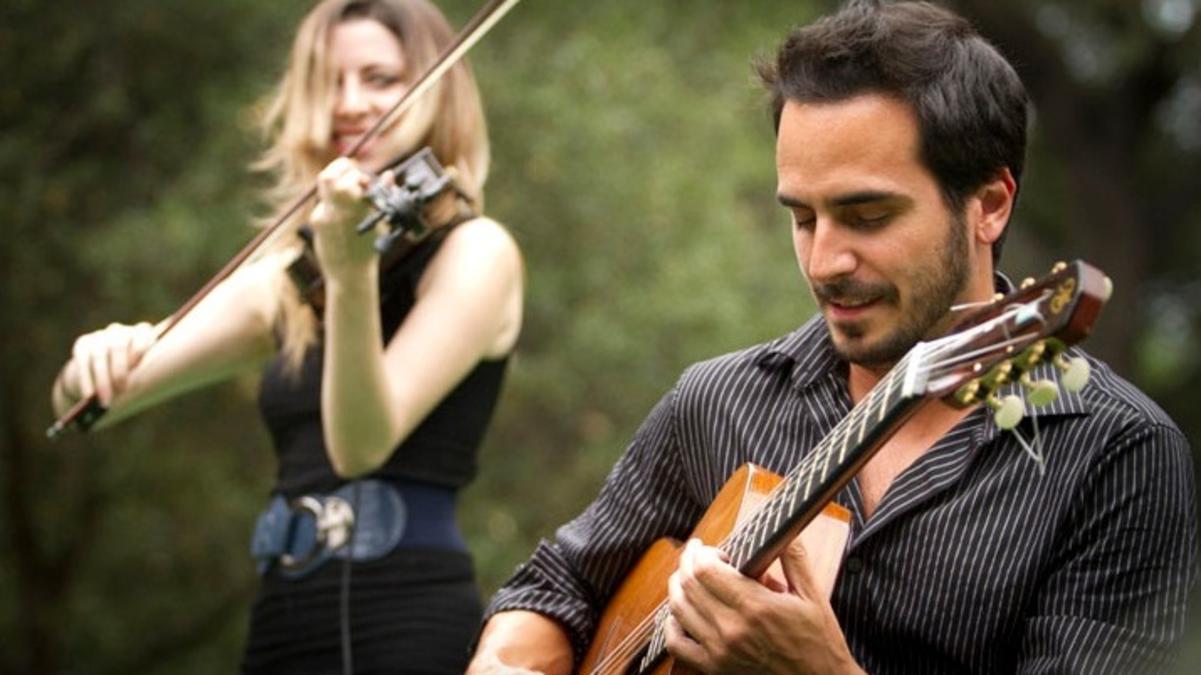Gonzalo Bergara is one of my favorite musicians ever. His music is pure joy and his funny, outgoing personality makes it even better to hang out with him.
Here’s the full story. And remember… “Never Give Up!” 😉
1 – What have inspired you to start playing music? Tell us about your influences and what was going on around you at the time.
I was 11 years old and I saw a Guns and Roses music video. Slash was being elevated from under the ocean playing a Gibson Les Paul, and making all these whale sounds with it. 🙂 Right then I decided I was going to play the guitar. I have yet to do that particular scene, though.
2 – What are your current projects?
The Gonzalo Bergara Quartet is finishing our 4th CD, “Claroscuro” coming out in November 2015.
Back home in Buenos Aires Argentina we started a new electric project called “Zalo’s Blues”. It’s a power trio where I play guitar and sing a bit with very strong Texan blues and Hendrix influences.
We are also doing a show in a few weeks that feature 12 of our compositions arranged for string quartet and guitar, a CD we will record next year.
3 – Since you’re an Argentinian guy one must ask… what about Tango? Do you dance? 🙂 And do you relate Tango with Gypsy Jazz, in any way?
I don’t dance, and there is very little tango I actually like today. But it’s been in my life since the beginning, one way or the other, so you can hear it in my music even when sometimes I can’t.
The drama, the intensity, the passion for a lack of better words, that’s where it comes from. Astor Piazzolla’s music, call it tango or not, really motivated me to try to write better stuff all the time.
4 – Can you identify what key elements motivate you to practicing guitar?
I have a bit of an obsessive personality, and jazz in general allows you to travel an endless road. I think it’s all about the constant gift to have the possibility of learning or discovering something new.
I’m very good at hearing my deficiencies too, so that puts me to practice quite often.
5 – What were the biggest challenges you have faced in order to progress in your practice, performance and musical career?
I would say finding new ways to go, to not get stuck in one place with your same 8 phrases. It’s very easy to get bored playing the same things over and over again. This might lead you to not having the desire to practice.
When you find something new you start growing that ability, energy and imagination that will, in some way, make you almost completely fall in love with your instrument all over again. I look for that everyday and it’s tough.
6 – You team up with Adrien Moignard in one of the most exciting new projects in Gypsy Jazz (Classico). Tell us about how this partnership was born and it’s dynamics and accomplishments so far.
I think in gypsy jazz, like it probably happens in all styles of music, there are many different styles inside that one style. Adrien and me spoke the same language, liked the same particular things in gypsy jazz.
It’s always a lot more fun to play with somebody you can connect that way. So it’s easy, we like the same things, so we get together and jam, and have a good time.
7 – Do you remember your practice process when you started playing? How much did it change through the years?
I think the more I grew as a player and a person I started being a bit more thoughtful. Perhaps, as we get older we don’t have the time we had before, so now I try to use my time a bit more wisely.
Today, if I’m about to sit down and practice, I’ll work on one of the things I know needs work. I think about what I’m going to practice before I sat down. Then I just play and let myself having a good time without thinking so much about the outcome.
(Gonzalo is actually talking about 2 of the most important aspects of productive practice: PLANNING and DIFUSE THINKING. More on those subjects on future posts 😉 )
I still do that, but I also like putting my time to specific areas where I feel I could improve.
8 – How does a regular day in your life looks like?
If I’m traveling with the band, it’s waking up, getting in a car, going to the airport, getting in another car, getting to the hotel, going to sound check, eating, playing the show, hopefully a fun gathering afterwards and hotel again. Tomorrow, same thing all over again.
If I’m home, I could spend a lot of the day practicing, or not practicing at all. I try to exercise, mess my mind, and feel better, like reading, hanging with friends, drinking wine, nothing extraordinary. Listening to music probably always.
9 – How do you balance work and rest?
Today I respect my desire, however I feel. If I don’t want to play the guitar I don’t. If I want to play it all day I will.
10 – What are your future plans and goals?
This has been a very busy year for me, working on three full projects. I’d like to slow down next year and maybe enjoy other things, just to make sure not to get burned too much.
11 – The Gonzalo Bergara Quartet (re) introduces the vocal and violin element in the Manouche Music, showing that this is not just a virtuoso guitar playing style. Was this something you deliberately looked for or just happened?
I try to feature the best about everybody that works with me, Leah Zeger joined the band and she had a fantastic technique and great vocal chords, so I just let things naturally go where they sound good. Whatever that may be.
12 – What key ingredients you love to hear in the music you love?
I must say: time, tone, imagination, passion, fire, and sensitivity.
13 – You moved from Argentina to France, worked with Denis Chang (Canadian), played with Andreas Oberg (Swedish), Joscho Stephan (German), amongst other “foreign” players. Everybody is from different places but manage to gather for the music. What are your feelings about this globalization of Gypsy Jazz?
I think music has always been this way, it’s a universal language, it’s a human thing. We are all one organism in some way and it seems perfectly normal that the same thing moves us all.
14 – You’re also part of an uprising community of Gadjos (non Gypsy) Manouche players in France, including Benoit Convert, Sebastien Giniaux, Adrien Moignard. Where does this burst of vitality, good taste and energy come from?
I think somebody who is responsible for that today would be Bireli Lagrene. To have the opportunity to strive in order to be that good, one day, gets all of us with the desire going.
15 – Do you meditate?
I like reading. A lot of the books I like are not necessarily about meditation or Tao or religion, but touch on those areas a bit.
16 – Is there any ritual or habit that you feel it pulls you towards a more focused, clear or mindful state?
I like going to the beach every tiny chance I got. There’s something about the ocean and the sun that clears me up.
17 – What would you consider to be the most important advice someone gave to you?
I don’t know if I’d call it “advice” but I have one vivid moment clear in my mind. I was having a great time playing a show and somebody just yelled at me as they were leaving: “never stop”.
At that time I thought: “why would I ever stop?”
Since then I have been faced with difficult turns, stressful moments, where I would think, ahh, this is what he meant. It’d be a lot easier to give it all up. “Never stop.”
18 – What’s the most important aspect of your life’s journey that you’d like people to remember?
I’m not sure I have an answer for this. I would like to make sure that I gave my best in all while I enjoyed every bit of time I have.
19 – What would you say to Django if you had the chance to meet him?
I heard he was a difficult person, so maybe I’d be curious about this personality aspect more than music.
20 – And what would be the record, the musician or the song that you would always refer in a conversation with Django?
I think classical music has been my biggest love since I can remember, so it would be some Debussy or Ravel piece, knowing that he liked those guys too.
21 – By the way, since you’re Argentinian and I’m Portuguese… Cristiano Ronaldo or Lionel Messi? 🙂
No soccer here man sorry. I’m sure they are all great! 🙂




